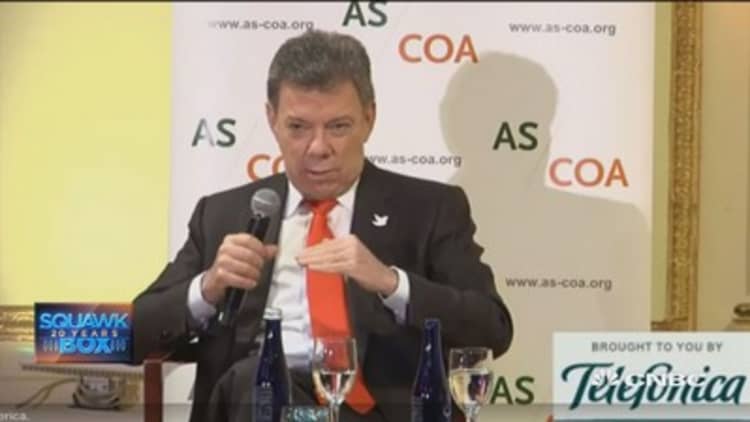
A tentative peace agreement would add at least 1.5 percent to Colombia's gross domestic "forever," according to President Juan Manuel Santos.
Santos, who spoke with CNBC while attending the U.N. General Assembly this week, referred to an agreement he reached last week with the Colombian FARC rebels on possibly ending a 50-year Marxist guerrilla war that has left more than 250,000 people dead.
No deal has been finalized, but the toughest issues were settled during a negotiating session in Havana, with a deadline of six months to finish what remains. In exchange for ending the violence and agreeing to disarm, the rebels will enter into a "transitional justice" process — a separate court system that will include international representatives. Those who confess to crimes will receive reduced sentences of five to eight years, they will not be extradited to the United States, and they will be permitted to enter politics.
Colombia, which has suffered economically along with the falling price of oil, will get a strong economic boost if the deal gets finalized, said Santos.
"The impact on economic growth is going to be very positive," he said. "There have been many calculations — I would say on average, and I'm using a conservative estimate, the growth of the country could increase around 1.5 percent forever." A video of Santos's talk can be seen here.
The deal has been criticized as being too lenient, even by Santos' previous boss, former Colombian President Alvaro Uribe, who has tweeted extensively about his anger over the deal. Under terms of the tentative agreement, even former FARC rebels accused of crimes against humanity would be allowed to run for public office.
Santos gave a vigorous defense of the agreement thus far, at a gathering of several hundred people at a luncheon at the Plaza Hotel in New York. "How much does it cost to continue this factory of victims producing death every day, displacing people? ... I can assure people war is always more costly than peace. … In Colombia, we are fed up with war and we want peace."
When asked if FARC leader Rodrigo Londono, whose nom de guerre is Timochenko, could run for president, Santos responded: "Why not?" His response drew an audible gasp from the audience, members of the Council of the Americas in New York.
"Will they do politics? Of course, that's the whole purpose of this peace process, to lay down their arms and continue their ideological struggle through legal means," he said.
Santos also promised that Colombians will vote on the final deal in a referendum, something he says he is not legally required to do.
"I negotiated that with the FARC. We will agree on ... a way for the people to express themselves through the ballot if they like it or not," he said. "So the answer is yes, I never even doubted I will comply with this promise, and yes, we will put the agreement to the people when we have the agreement ready."



